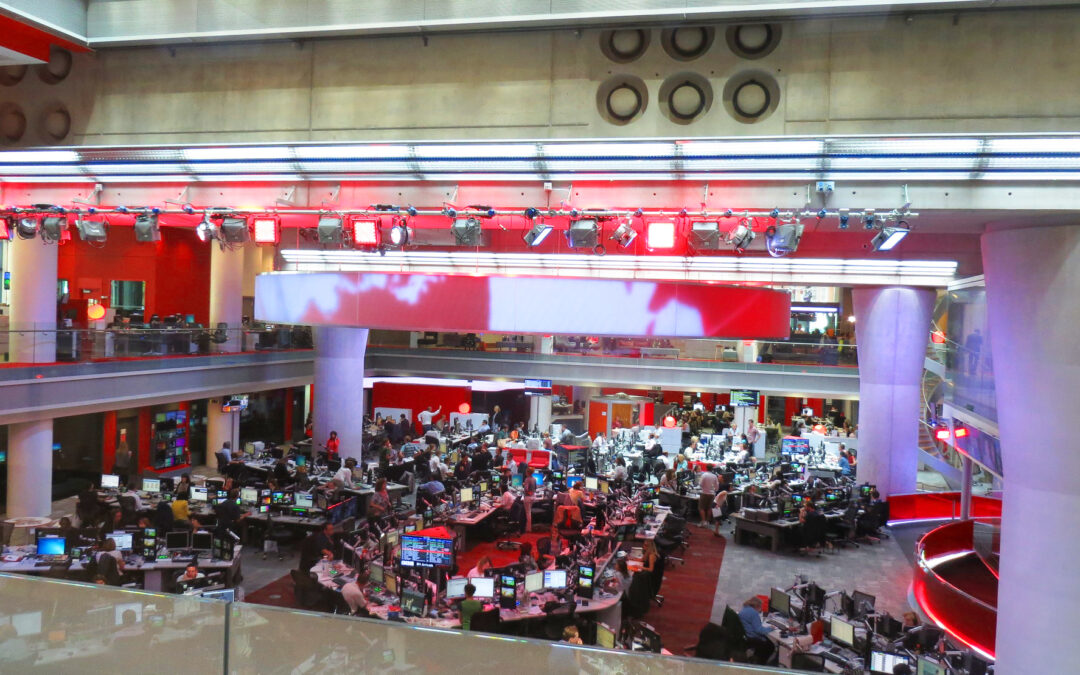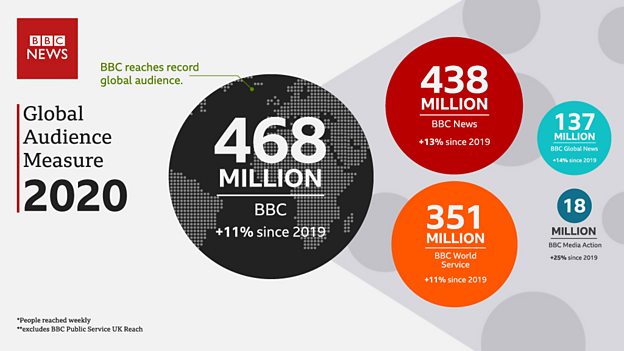
26 June 2019
Text and video content from the BBC News Chinese website bbc.com/chinese now features on the popular Hong Kong news portal, Yahoo Hong Kong, and its mobile apps, Yahoo Hong Kong News and Yahoo TV.
Thanks to an agreement between BBC News and Yahoo Hong Kong, the BBC News Chinese content will be published as top stories on the Yahoo site. The Yahoo Hong Kong homepage now features a BBC News Chinese index.
Business Development Director, BBC World Service, Simon Kendall, says: “This is a great development for the BBC in Hong Kong where our news services in English, Cantonese and Mandarin reach a million people weekly. We have a strong and loyal audience on the audio platform, and with this partnership we will look to further enhance our engagement with digital audiences.”
Launched in 1999, Yahoo Hong Kong is one of the territory’s leading news portals. Rico Chan, Director of Yahoo Hong Kong, says: “Deeply rooted in Hong Kong, we have been serving it for two decades, and it is our ultimate goal to establish a high standard and trusted content platform by partnering with forward-thinking and pioneering media to catalyse the development of media industry. BBC News is one of the most valuable media brands globally, with positive and sharp ambitions. Our collaboration with BBC News Chinese strengthens our commitment to our users, allowing us to offer more abundant, premium, reliable content to millions in Hong Kong.”
The BBC’s recently launched Hong Kong bureau is home to journalists working on news in Mandarin, Cantonese and English, as well as to the commercial news operation, BBC Global News. The BBC also has an office for BBC Studios in Hong Kong, bringing world-class drama and entertainment programmes to Chinese audiences.
BBC News is available in Hong Kong on TV, via the BBC World News channel; online in English via bbc.com/news, and in simplified and traditional Chinese script, along with audio content in Cantonese and Mandarin, onbbc.com/chinese. The BBC News Chinese weekly hour-long radio programme in Cantonese, Newsweek, is broadcast on RTHK, along with the daily overnight broadcasts of BBC World Service radio in English. BBC Minute, a 60-second news bulletin in English, is carried by Hong Kong’s Metro Radio.
BBC News Chinese is part of BBC World Service which delivers news content around the world in English and 41 other language services, on radio, TV and digital. BBC World Service reaches a weekly audience of 319m. As part of BBC World Service, BBC Learning English teaches English to global audiences. BBC News attracts a weekly global audience of 394m people to its international services including BBC World Service, BBC World News television channel and bbc.com/news.

18 June 2019
More people around the world are tuning into the BBC than ever before, reaching a new high of 426m a week – an increase of 50m (13 percent) over the year, according to new figures released on 18 June 2019.
The Global Audience Measure (GAM) shows BBC News has an audience of 394m globally, a rise of 47m. The BBC World Service in English, and 42 languages, account for 319m of that figure – with an increase of 41m.
BBC World Service in English and the BBC World News TV channel have both achieved all-time record audiences of 97m and 101m respectively. BBC World Service’s 42 language services have climbed to 259m. BBC Global News, the commercial subsidiary of BBC News which operates the BBC World News channel and bbc.com, makes up most of the remainder and has seen increases across TV and digital of 6m, to 121m – another record high. Overall, BBC News has seen increases of 23m for TV (to 214m), 12m for audio (to 178m) and 18m for online (to 95m).
 BBC Director-General Tony Hall (pictured) says: “Every day our teams do an amazing job bringing independent, impartial news to audiences around the world, and today we can see just how much the BBC is valued. Thanks to Government investment we’ve been able to launch the biggest expansion of the World Service since the Second World War, and this shows how much the BBC can do for the UK.”
BBC Director-General Tony Hall (pictured) says: “Every day our teams do an amazing job bringing independent, impartial news to audiences around the world, and today we can see just how much the BBC is valued. Thanks to Government investment we’ve been able to launch the biggest expansion of the World Service since the Second World War, and this shows how much the BBC can do for the UK.”
Jamie Angus, Director of the BBC World Service Group, says: “The BBC is on track to reach its audience target of 500m weekly, and has posted all-time record audiences for both World Service Radio and BBC World News. But most importantly we’re continuing to produce groundbreaking journalism that is attracting growing audiences, and making huge impact. From investigative journalism like Africa Eye to our work countering fake news and disinformation, the BBC is showing why it remains the world’s most trusted source of news.”
Three countries – India, Kenya and the USA – have seen the most impressive gains since 2018.
India, where BBC News now operates in nine languages, has seen a rise of 20m to 50m to become the top overseas market for BBC News. The USA becomes the third largest market overall with 38m, up 5m. The audience in Kenya has increased from 6m to 15m in the last year reaching 50 percent of the population. In Afghanistan, the BBC reaches 59 percent of the population. BBC News websites (World Service and bbc.com) have increased their combined reach by 6m to 51m globally, bucking wider trends for news sites.
The top 10 countries by BBC News audience are:
- India 50m
- Nigeria 41m
- USA 38m
- Kenya 15m
- Afghanistan 12m
- Bangladesh 12m
- Egypt 11m
- Iran 11m
- Tanzania 10m
- Pakistan 9m
Syndication of BBC content via partner television and radio stations around the world, and distribution via digital platforms like YouTube and Facebook, now add up to over 60 percent of audience reach.
Audio continues to be a major platform for the World Service, rising by 12.9m to 173m listeners worldwide. On all platforms, 30 percent of the audience is aged between 15-24 years.
Over the past two years new BBC News bureaux were opened in India, Kenya, Nigeria and South Korea, and 12 new language services were launched as part the largest expansion of the BBC World Service since the 1940s, funded by the UK government. The expansion has taken place against a background of rapid growth of rival international news services from Russia, China and the Middle East.

25 May 2017
The BBC is reaching a record weekly audience of 372m around the world, a rise of 7 per cent year on year, new audience figures published on 25 May 2017 reveal.
These figures – the Global Audience Measure (GAM) – show how many individuals the BBC reached weekly with its news and entertainment content in the year 2016/17.
The data show the BBC’s weekly global news audience has risen by 8 per cent to 346m, with TV, audio and social media driving the increase.
The BBC World Service has seen an increase of 9 per cent since last year, taking its total audience to 269m.
Global News Ltd, which comprises BBC World News television and BBC.com, now has an audience of 121m, an increase of 12 per cent, with weekly BBC World News TV viewers rising to 99m.
World Service English has seen another significant rise, with an audience of 75m around the world, a 14 per cent increase. This has been driven both by syndication and by the growth of digital audio, including internet audio and podcasts. The number of listeners accessing World Service English through internet audio has shot up by 147 per cent to 21m.
The GAM figures show the BBC is on track to achieve the target set by the Director General of a 500m weekly audience by 2022, the BBC’s centenary year.
 Francesca Unsworth, Director of the BBC World Service Group, says: “In a turbulent year for international news, with mounting concern about fake news and social media filter bubbles, more people than ever before are turning to the BBC for reliable, impartial information they can trust.
Francesca Unsworth, Director of the BBC World Service Group, says: “In a turbulent year for international news, with mounting concern about fake news and social media filter bubbles, more people than ever before are turning to the BBC for reliable, impartial information they can trust.
“We will shortly launch the first new language services in the biggest expansion of the World Service since the 1940s. Today’s audience figures show the need for the BBC is greater than ever.”
 Tim Davie, Director of Global and CEO of BBC Worldwide, says: “It is encouraging to see that BBC branded services continue to be the trusted go-to platforms for audiences across the globe.”
Tim Davie, Director of Global and CEO of BBC Worldwide, says: “It is encouraging to see that BBC branded services continue to be the trusted go-to platforms for audiences across the globe.”
- Facebook is by far the biggest source of the BBC’s social media reach globally, but there are regional variations – in Iran alone BBC reaches 1.4m people on the encrypted messaging app Telegram, from a total BBC audience of 12.6m in that country.
- The top ten markets for the BBC’s international news services are Nigeria (36m), USA (34m), India (28m), Bangladesh (16m), Egypt (15m), Pakistan (13m), Iran (13m), Tanzania (10m), Indonesia (7.6m), and Canada (7.5m), where the BBC significantly boosted its presence last year.
- BBC radio saw a 12 per cent uplift in audience figures in the USA during an eventful election year – taking weekly reach to 14.6m people





 BBC Director-General Tony Hall (pictured) says: “Every day our teams do an amazing job bringing independent, impartial news to audiences around the world, and today we can see just how much the BBC is valued. Thanks to Government investment we’ve been able to launch the biggest expansion of the World Service since the Second World War, and this shows how much the BBC can do for the UK.”
BBC Director-General Tony Hall (pictured) says: “Every day our teams do an amazing job bringing independent, impartial news to audiences around the world, and today we can see just how much the BBC is valued. Thanks to Government investment we’ve been able to launch the biggest expansion of the World Service since the Second World War, and this shows how much the BBC can do for the UK.”
 Francesca Unsworth, Director of the BBC World Service Group, says: “In a turbulent year for international news, with mounting concern about fake news and social media filter bubbles, more people than ever before are turning to the BBC for reliable, impartial information they can trust.
Francesca Unsworth, Director of the BBC World Service Group, says: “In a turbulent year for international news, with mounting concern about fake news and social media filter bubbles, more people than ever before are turning to the BBC for reliable, impartial information they can trust. Tim Davie, Director of Global and CEO of BBC Worldwide, says: “It is encouraging to see that BBC branded services continue to be the trusted go-to platforms for audiences across the globe.”
Tim Davie, Director of Global and CEO of BBC Worldwide, says: “It is encouraging to see that BBC branded services continue to be the trusted go-to platforms for audiences across the globe.”